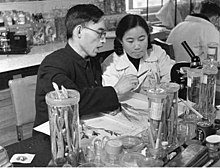Do youyou
Tu Youyou ( Chinese 屠 呦 呦 , Pinyin Tú Yōuyōu , IPA ( standard Chinese) [ tʰǔ jəʊ˥jəʊ˥ ], W.-G. T'u Yu-yu ; born December 30, 1930 in Ningbo , Republic of China ) is a Chinese pharmacologist and Nobel Prize Winner . She isolated the phytochemicals artemisinin used to treat malaria from annual mugwort ( Artemisia annua , 黃花 蒿 / 黄花 蒿 , huánghuāhāo , TCM medicine Arz , qīnghāo ).
Professional development
Tu studied from 1951 until 1955 the Faculty of Pharmacy at the Medical University of Peking ( Beijing Medical University , now Peking University Health Science Center ). Since then she has worked at the Institute of Materia Medica of the Chinese Academy for Traditional Chinese Medicine , most recently as a professor.
Research priorities
In search of potential active ingredients against malaria, Tu and her working group analyzed numerous medicinal plants on behalf of the Chinese government (“Project 523”) based on the traditions of traditional Chinese medicine . In 1971 the active ingredient was isolated from Artemisia annua , and in 1972 it was presented. In 1973 she synthesized the more potent derivative dihydroartemisinin . Later work is devoted to the use of artemisinin and its derivatives in other diseases. Tu Youyou received the Lasker ~ DeBakey Clinical Medical Research Award in 2011 for “the discovery of artemisinin, a malaria therapeutic that saved millions of lives worldwide, especially in developing countries” . In 2015 she was awarded the Nobel Prize in Physiology or Medicine , together with William C. Campbell and Satoshi Ōmura , which she received on December 10, 2015. Her research into malaria therapy is given as a reason.
Awards (selection)
- Winner of numerous Chinese science awards
- 2011: Lasker ~ DeBakey Clinical Medical Research Award
- 2015: Warren Alpert Foundation Prize
- 2015: Nobel Prize in Physiology or Medicine
- 2015: An asteroid named after her: (31230) Tuyouyou
literature
- Tu Youyou: The discovery of artemisinin (qinghaosu) and gifts from Chinese medicine . In: Nature Medicine . Volume 17, Number 10, October 2011 ( full text )
- Ushma S. Neill: From branch to bedside: Youyou Tu is awarded the 2011 Lasker ~ DeBakey Clinical Medical Research Award for discovering artemisinin as a treatment for malaria . In: The Journal of Clinical Investigation. 2011, doi: 10.1172 / JCI60887
- Fulong Liao: Discovery of Artemisinin (Qinghaosu). In: Molecules . Volume 14, 2009, pp. 5362-5366, doi: 10.3390 / molecules14125362 .
- LH Miller, X. Su: Artemisinin: Discovery from the Chinese herbal garden. In: Cell. Volume 146, number 6, September 2011, pp. 855-858, doi: 10.1016 / j.cell.2011.08.024 , PMID 21907397 , PMC 3414217 (free full text).
- Jane Perlez: Answering an Appeal by Mao Led Tu Youyou, a Chinese Scientist, to a Nobel Prize. In: The New York Times . October 6, 2015.
- Rolf Bökemeier: A herb works wonders . In: Geo . No. 6, 2006.
Web links
- Lasker Foundation: Lasker ~ DeBakey Clinical Medical Research Award - Tu Youyou . (with video interview of the award winner ).
- Paul U. Innocence: Research for Mao. In: Der Tagesspiegel (December 10, 2015)
Individual evidence
- ↑ Presentation on the website of the Institute of Materia Medica of the Chinese Academy of Traditional Chinese Medicine ( Memento from September 6, 2011 in the Internet Archive ), accessed on November 30, 2018.
- ^ The Nobel Prize in Physiology or Medicine 2015. In: The Nobel Prize. Retrieved March 7, 2019 (American English).
- ^ Artemisia annua L .; Artemisia annua f. macrocephala pampanini; A. chamomilla C. Winkler; A. stewartii CB Clarke; A. wadei Edgeworth., Chin .: Huanghuahao - [黃花 蒿 / 黄花 蒿] : - Retrieved October 17, 2016 - efloras.org - FOC - Online
- ↑ Sweet Wormwood Herb, scientific: Artemisiae Annuae Herba, chin .: Qinghao - [青蒿] : - Retrieved October 17, 2016 - hkbu.edu.hk - Chinese Medical Material Image Database - Hong Kong Baptist University - Online
- ↑ Artemisia carvifolia; Buch.-Ham. ex Roxb., chin .: Qinghao - [青蒿] : - Retrieved October 17, 2016 - efloras.org - FOC - Online
- ↑ Ushma S. Neill: From branch to bedside: Youyou Tu is awarded the 2011 Lasker ~ DeBakey Clinical Medical Research Award for discovering artemisinin as a treatment for malaria . In: The Journal of Clinical Investigation. 2011, doi: 10.1172 / JCI60887 .
- ↑ a b c Tu Youyou: The discovery of artemisinin (qinghaosu) and gifts from Chinese medicine . In: Nature Medicine . Volume 17, Number 10, October 2011, p. XIX ( full text )
- ↑ Rolf Bökemeier: A herb works wonders . In: Geo . No. 6, 2006.
- ↑ a b c Lasker Foundation: Lasker Clinical Medical Research Award - Tu Youyou , accessed September 12, 2011.
- ↑ Original text: "For the discovery of artemisinin, a drug therapy for malaria that has saved millions of lives across the globe, especially in the developing world."
- ↑ Nobelprize.org: The Nobel Prize in Physiology or Medicine 2015 , accessed October 5, 2015.
- ↑ Fulong Liao: Discovery of Artemisinin (Qinghaosu). In: Molecules. Volume 14, 2009, pp. 5362-5366, doi: 10.3390 / molecules14125362 .
- ^ First Nobel Prize for Medicine for China, Research for Mao. In: Der Tagesspiegel. Retrieved November 11, 2019 .
| personal data | |
|---|---|
| SURNAME | Do youyou |
| BRIEF DESCRIPTION | Chinese pharmacologist |
| DATE OF BIRTH | December 30, 1930 |
| PLACE OF BIRTH | Ningbo |

